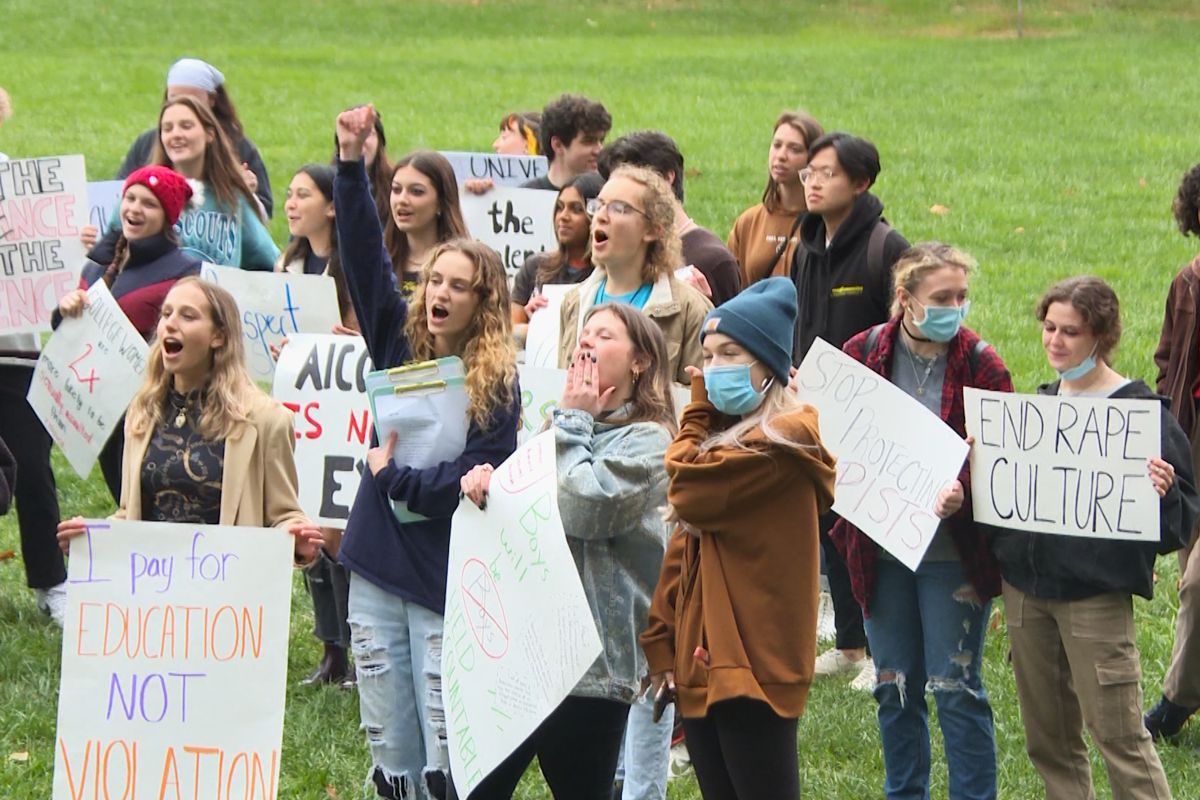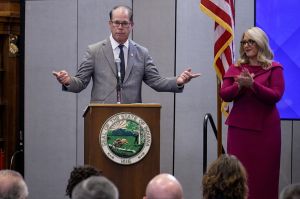
Indiana University students at a rally in 2021. That year, sororities paused events due to increases in sexual assault. (WTIU/WFIU File)
Indiana University alumna Madison Smith's advocacy began after she was raped at a fraternity her sophomore year. She said her sorority didn’t stand by her, prioritizing maintaining relationships with fraternities over supporting their sister.
Once Smith started speaking out, she said dozens of women came to her with similar stories.
“If you call it a Greek Life problem, the insinuation there is that if these women hadn't become involved in sororities, they would have avoided this,” Smith said. “Which is both potentially untrue and also just unfair, because it's the culture of fraternities that's the problem.”
Indiana University Greek Life events are back, after a three-week pause in March. The Interfraternity Council and Panhellenic Association didn’t share many details, except that the pause was due to “health and safety concerns.” Neither group explained what changed during the pause, and didn’t respond to requests for comment.
Read more: All fraternity, sorority social events on hold until March 24
Greek Life leaders last paused events in 2021, because sororities noticed increasing sexual assault and demanded change. The next year, the two councils passed new health and safety regulations after sorority women “have long called for additional safety precautions,” the Indiana Daily Student reported.
“Putting more power in the hands of sorority women is really important,” Smith said.
IU reports nearly a quarter of students are involved in Greek Life.
“The Office of Student Life continues to work with student leaders to ensure a safe, welcoming, and positive environment for all who participate in Greek Life,” the university said.
The IU Police Department continues to handle reports of crimes including sexual assault and hazing in Greek life. Even during the pause, the IUPD received reports involving fraternities.
“It is hard to know whether our numbers are rising or if we just see that folks are more comfortable coming forward to report, which is what we want,” said Hannah Skibba, IUPD public information officer.
Zoe Peterson, senior scientists and director of Kinsey Institute Sexual Assault Research Initiative, agrees with the difficulties of judging the prevalence of assault based on reports alone.
Men and women in the Greek system are more likely to be victims of sexual assault than those out of the system, Peterson said. It could be because of the location of events and the attitudes in Greek life, specifically in fraternities. Greek Life social events— which sometimes come with alcohol — are typically on men’s terms, and they control the environment, the guest list and sometimes the transportation.
“It does seem like some fraternities seem to promote attitudes that are very much associated with sexual perpetration risk, so sort of disrespect toward women, sexism, heterosexism, kind of a sexual competition among the men,” said Peterson.
Read more: House committee guts bill that would've eliminated statute of limitations for all rape crimes
Smith said the issues in Greek Life are structural, and the solutions should come from the university and national organizations. Groups of 20-year-olds are managing their chapters’ board, leading the IFC or PHA, getting their degrees and dealing with everything else in their lives, she said.
“You can be the smartest college student in the world with the best intentions and still not have the emotional or temporal resources to be a support to a single victim,” Smith said. “Not to mention be basically, single-handedly responsible for protecting 120 people from gender-based violence on campus.”

- Madison Smith (right) on March 9, 2025 at Desert International Horse Park in California. An IU graduate, Smith works with #WeRideTogether to prevent sexual misconduct in sports. (Courtesy of Madison Smith)
The Office of Student Life offers educational programming for Greek Life chapters. The IU IFC bylaws state sexual violence educational programming should be encouraged or required by chapters. Each chapter is required to have a risk management policy for sexual violence, along with a statement supporting environments free of sexual misconduct. Chapters hosting social events are required to have one sober monitor per 20 people. The monitors must be trained in sexual assault awareness and prevention.
Peterson believes that fraternities could be protective environments if the members of the group challenge bad behavior.
“Groups where the men are very outspoken and stand up when members of the group kind of express any of those attitudes, would probably be protected environments,” said Peterson. “I actually really see a role for the Greek system and helping to prevent sexual assault and sexual violence.”
Today, Smith works with the non-profit #WeRideTogether to combat sexual misconduct in sports. She said most victims know the person who assaulted them, and at least half of sexual assaults involved substances.
“It’s basically scarier for the human brain to feel out of control than to feel like it's your fault,” Smith said. “But it wasn't, and it isn't.”
Read more: Pause on Greek events at IU ends, but what has changed?
Smith said it’s helpful for victims to talk to someone trusted. IU’s The Office for Sexual Violence Prevention and Victim Advocacy offers support including confidential victim advocates and crisis services. The university’s Title XI coordinators also investigate sexual misconduct, and Skibba said victims can contact the IUPD for resources even if they don’t want to press charges.
ACTION, an IU Student Government campaign, aims to implement Proclamation 112. It calls on all Greek councils to require mandatory sexual assault prevention training. Smith tried to enforce this while she was at IU, but the policy never went into effect.
Every sorority chapter is required to have Safe Sisters, a program that trains selected members to listen and validate, assess needs and support choices of the survivor of a sexual assault. They also spread education about consent, rape culture, and bystander intervention to prevent sexual assault in the Greek community.
After Smith was raped, she said her friend dropped out of their sorority for her. Though it might be hard socially or the trauma might make someone behave unusually, Smith says all survivors deserve support.
“The absolute best thing you can do is just be there,” Smith said. “Tell them you believe them. Tell them you're sorry. Tell them they didn't deserve it. Even validating language is key.”











